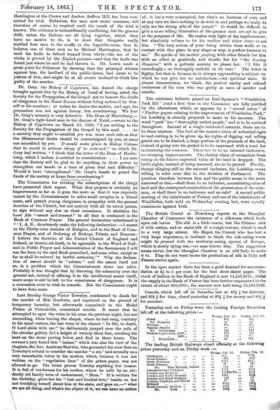Last Sunday George Victor Townley, condemned to death for the
murder of Miss Goodwin, and reprieved on the ground of temporary insanity, but afterwards committed to the Model Prison at Pentonville, committed suicide. It seems that he attempted to open the veins in his arms the previous night, but not succeeding, when leaving the chapel, where he had sung, contrary to his usual custom, the last verse of the chaunt " In life, in death, 0 Lord abide with me !" he deliberately jumped over the rails of the circular gallery, fell a height of twenty-three feet, crushing his head on the stone paving below, and died in three hours. The coroner's jury found him " insane," which was also the view of the chaplain, the Rev. Ambrose Sherwin, who grounded his view first on Townley's refusal to consider the murder " a sin," and secondly on a very remarkable letter to his mother, which, because it was not written on the " regulation lines " of the prison paper, was not allowed to go. The letter proves Townley anything but insane. It is full of tenderness for his mother, whom he calls by an evi- dently old family term of endearment, "Mum." It is written for her birthday, gives her his " beet and kindest love," insists on her not troubling herself about him or his state, and goes on,—" what we are all doing, and what's the object of it, we can have no notion of ; it loo'is very nonsensical, but that's no business of ours, and at any rate we have nothing to do with it, and perhaps we really do only see the wrong side of the carpet." It would be difficult to give a more telling illustration of the guesses men are apt to give at the purposes of life. He makes very light of his imprisonment, but absolutely refuses to let his mother and sister come to see him. "The very notion of your being within these walls, or in contact with this place in any shape or way, is perfect torment to me." He speaks of his mother praying with other friends for him with an effort at gratitude, and thanks her for "the Sunday Magazine" with a pathetic anxiety to please her. " I like it exceedingly,— so thoroughly catholic in its tone." The letter is flighty, but that is because he is always approaching a subject on which he can give her no satisfaction,—his spiritual state. It almost demonstrates, we think, the perfect sanity and refined tenderness of the man who was guilty at once of murder and suicide.






























 Previous page
Previous page